The last one to seize the ticket to the Asian Games
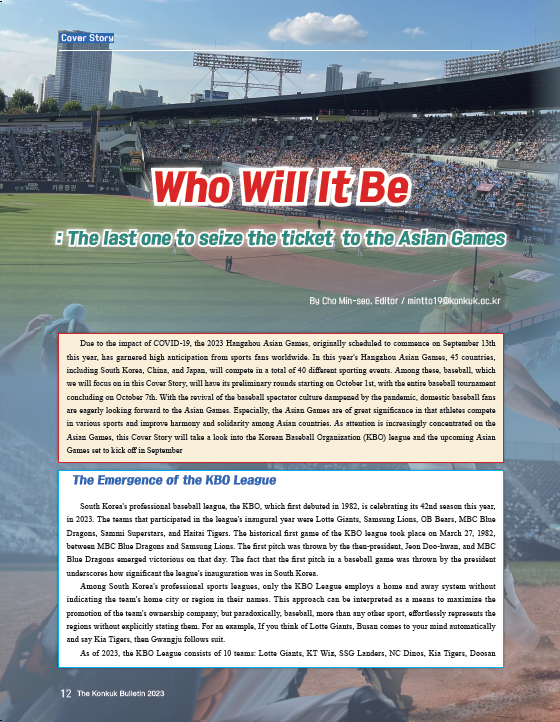
Due to the impact of COVID-19, the 2023 Hangzhou Asian Games, originally scheduled to commence on September 13th this year, has garnered high anticipation from sports fans worldwide. In this year's Hangzhou Asian Games, 45 countries, including South Korea, China, and Japan, will compete in a total of 40 different sporting events. Among these, baseball, which we will focus on in this Cover Story, will have its preliminary rounds starting on October 1st, with the entire baseball tournament concluding on October 7th. With the revival of the baseball spectator culture dampened by the pandemic, domestic baseball fans are eagerly looking forward to the Asian Games. Especially, the Asian Games are of great significance in that athletes compete in various sports and improve harmony and solidarity among Asian countries. As attention is increasingly concentrated on the Asian Games, this Cover Story will take a look into the Korean Baseball Organization (KBO) league and the upcoming Asian Games set to kick off in September.
The Emergence of the KBO League
South Korea's professional baseball league, the KBO, which first debuted in 1982, is celebrating its 42nd season this year, in 2023. The teams that participated in the league's inaugural year were Lotte Giants, Samsung Lions, OB Bears, MBC Blue
Dragons, Sammi Superstars, and Haitai Tigers. The historical first game of the KBO league took place on March 27, 1982, between MBC Blue Dragons and Samsung Lions. The first pitch was thrown by the then-president, Jeon Doo-hwan, and MBC
Blue Dragons emerged victorious on that day. The fact that the first pitch in baseball game was thrown by the president underscores how significant the league's inauguration was in South Korea.
Among South Korea's professional sports leagues, only the KBO League employs a home and away system without indicating the team's home city or region in their names. This approach can be interpreted as a means to maximize the promotion of the team's ownership company, but paradoxically, baseball, more than any other sport, effortlessly represents the regions without explicitly stating them. For an example, If you think of Lotte Giants, Busan comes to your mind automatically and say Kia Tigers, then Gwangju follows suit.
As of 2023, the KBO League consists of 10 teams: Lotte Giants, KT Wiz, SSG Landers, NC Dinos, Kia Tigers, Doosan Bears, Samsung Lions, Kiwoom Heroes, Hanwha Eagles, and LG Twins. The regular season of the KBO League, known as the "Pennant Race," typically begins in late March or early April and concludes as early as early October or as late as late October. Each team plays 144 games, with 73 being “home” games and the remaining 71 being “away” games. The opening series of each season is granted to the top five teams from the previous season's final standings for a set of five consecutive home games.
The regular season rankings are determined by winning percentage, and the top five teams based on winning percentage advance to the KBO post season, often referred to as "Fall Baseball." As of the first week of September 2023, the five teams slated to enter the KBO postseason are LG in 1st place, KT in 2nd, SSG in 3rd, NC in 4th, and Kia in 5th. Doosan in 6th place and Lotte in 7th are closely pursuing them in the rankings.
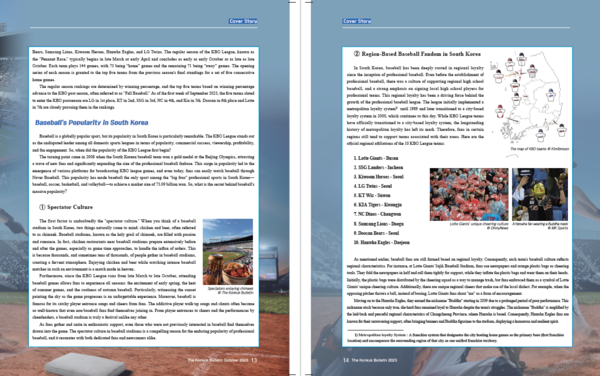
Baseball's Popularity in South Korea
Baseball is a globally popular sport, but its popularity in South Korea is particularly remarkable. The KBO League stands out as the undisputed leader among all domestic sports leagues in terms of popularity, commercial success, viewership, profitability, and fan engagement. So, when did the popularity of the KBO League first begin?
The turning point came in 2008 when the South Korean baseball team won a gold medal at the Beijing Olympics, attracting a wave of new fans and significantly expanding the size of the professional baseball fanbase. This surge in popularity led to the emergence of various platforms for broadcasting KBO league games, and even today, fans can easily watch baseball through Naver Baseball. This popularity has made baseball the only sport among the "big four" professional sports in South Korea—baseball, soccer, basketball, and volleyball—to achieve a market size of 73.09 billion won. So, what is the secret behind baseball's massive popularity?
① Spectator Culture
The first factor is undoubtedly the "spectator culture." When you think of a baseball stadium in South Korea, two things naturally come to mind: chicken and beer, often referred to as chimaek. Baseball stadiums, known as the holy grail of chimaek, are filled with passion and romance. In fact, chicken restaurants near baseball stadiums prepare extensively before and after the games, especially as game time approaches, to handle the influx of orders. This is because thousands, and sometimes tens of thousands, of people gather in baseball stadiums, creating a fervent atmosphere. Enjoying chicken and beer while watching intense baseball matches in such an environment is a match made in heaven.
Furthermore, since the KBO League runs from late March to late October, attending baseball games allows fans to experience all seasons: the excitement of early spring, the heat of summer games, and the coolness of autumn baseball. Particularly, witnessing the sunset painting the sky as the game progresses is an unforgettable experience. Moreover, baseball is famous for its catchy player entrance songs and cheers from fans. The addictive player walk-up songs and chants often become so well-known that even non-baseball fans find themselves joining in. From player entrances to cheers and the performances by cheerleaders, a baseball stadium is truly a festival unlike any other.
As fans gather and unite in enthusiastic support, even those who were not previously interested in baseball find themselves drawn into the game. The spectator culture in baseball stadiums is a compelling reason for the enduring popularity of professional baseball, and it resonates with both dedicated fans and newcomers alike.
② Region-Based Baseball Fandom in South Korea
In South Korea, baseball has been deeply rooted in regional loyalty since the inception of professional baseball. Even before the establishment of professional baseball, there was a culture of supporting regional high school baseball, and a strong emphasis on signing local high school players for
professional teams. This regional loyalty has been a driving force behind the growth of the professional baseball league. The league initially implemented a metropolitan loyalty system1) until 1989 and later transitioned to a city-based loyalty system in 2000, which continues to this day. While KBO League teams have officially transitioned to a city-based loyalty system, the longstanding
history of metropolitan loyalty has left its mark. Therefore, fans in certain regions still tend to support teams associated with their areas. Here are the official regional affiliations of the 10 KBO League teams:
1. Lotte Giants - Busan
2. SSG Landers - Incheon
3. Kiwoom Heroes - Seoul
4. LG Twins - Seoul
5. KT Wiz - Suwon
6. KIA Tigers - Kwangju
7. NC Dinos - Changwon
8. Samsung Lions - Daegu
9. Doosan Bears - Seoul
10. Hanwha Eagles - Daejeon
As mentioned earlier, baseball fans are still formed based on regional loyalty. Consequently, each team's baseball culture reflects regional characteristics. For instance, at Lotte Giants' Sajik Baseball Stadium, fans use newspapers and orange plastic bags as cheering tools. They fold the newspapers in half and roll them tightly for support, while they inflate the plastic bags and wear them on their heads. Initially, the plastic bags were distributed by the cheering squad as a way to manage trash, but fans embraced them as a symbol of Lotte Giants' unique cheering culture. Additionally, there are unique regional cheers that make use of the local dialect. For example, when the opposing pitcher throws a ball, instead of booing, Lotte Giants fans shout "ma" as a form of encouragement.
Moving on to the Hanwha Eagles, they earned the nickname "Buddha" starting in 2009 due to a prolonged period of poor performance. This nickname stuck because only true, die-hard fans remained loyal to Hanwha despite the team's struggles. The nickname "Buddha" is amplified by the laid-back and peaceful regional characteristics of Chungcheong Province, where Hanwha is based. Consequently, Hanwha Eagles fans are known for their unwavering support, often bringing banners and Buddha figurines to the stadium, displaying a humorous and resilient spirit.
------------------------
1) Metropolitan loyalty System : A franchise system that designates the city hosting home games as the primary base (first franchise location) and encompasses the surrounding region of that city as one unified franchise territory.
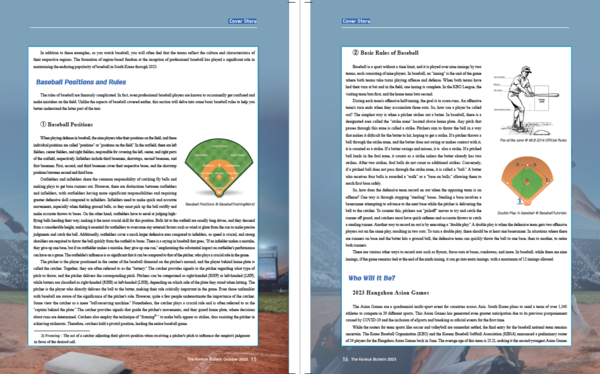
In addition to these examples, as you watch baseball, you will often feel that the teams reflect the culture and characteristics of their respective regions. The formation of region-based fandom at the inception of professional baseball has played a significant role in maintaining the enduring popularity of baseball in South Korea through 2023.
Baseball Positions and Rules
The rules of baseball are famously complicated. In fact, even professional baseball players are known to occasionally get confused and make mistakes on the field. Unlike the aspects of baseball covered earlier, this section will delve into some basic baseball rules to help you better understand the latter part of the text.
① Baseball Positions
When playing defense in baseball, the nine players take their positions on the field, and these
individual positions are called "positions" or "positions on the field." In the outfield, there are left fielders, center fielders, and right fielders, responsible for covering the left, center, and right parts of the outfield, respectively. Infielders include third basemen, shortstops, second basemen, and first basemen. First, second, and third basemen cover their respective bases, and the shortstop positions between second and third base.
Outfielders and infielders share the common responsibility of catching fly balls and making plays to get base runners out. However, there are distinctions between outfielders and infielders, with outfielders having more significant responsibilities and requiring greater defensive skill compared to infielders. Infielders need to make quick and accurate movements, especially when fielding ground balls, as they must pick up the ball swiftly and make accurate throws to bases. On the other hand, outfielders have to excel at judging highflying balls heading their way, making it the most crucial skill for this position. Balls hit to the outfield are usually long drives, and they descend from a considerable height, making it essential for outfielders to overcome any external factors such as wind or glare from the sun to make precise
judgments and catch the ball. Additionally, outfielders cover a much larger defensive area compared to infielders, so speed is crucial, and strong shoulders are required to throw the ball quickly from the outfield to bases. There is a saying in baseball that goes, "If an infielder makes a mistake, they give up one base, but if an outfielder makes a mistake, they give up one run," emphasizing the substantial impact an outfielder's performance can have on a game. The outfielder's influence is so significant that it can be compared to that of the pitcher, who plays a crucial role in the game.
The pitcher is the player positioned in the center of the baseball diamond on the pitcher's mound, and the player behind home plate is called the catcher. Together, they are often referred to as the "battery." The catcher provides signals to the pitcher regarding what type of pitch to throw, and the pitcher delivers the corresponding pitch. Pitchers can be categorized as right-handed (RHP) or left-handed (LHP), while batters are classified as right-handed (RHB) or left-handed (LHB), depending on which side of the plate they stand when hitting. The pitcher is the player who directly delivers the ball to the batter, making their role critically important in the game. Even those unfamiliar with baseball are aware of the significance of the pitcher's role. However, quite a few people underestimate the importance of the catcher. Some view the catcher as a mere "ball-receiving machine." Nonetheless, the catcher plays a crucial role and is often referred to as the "captain behind the plate." The catcher provides signals that guide the pitcher's movements, and they guard home plate, where decisions about runs are determined. Catchers also employ the technique of "framing2) " to make balls appear as strikes, thus assisting the pitcher in achieving strikeouts. Therefore, catchers hold a pivotal position, leading the entire baseball game.
---------------------
2) Framing : The act of a catcher adjusting their glove's position when receiving a pitcher's pitch to influence the umpire's judgment in favor of the desired call.
② Basic Rules of Baseball
Baseball is a sport without a time limit, and it is played over nine innings by two teams, each consisting of nine players. In baseball, an "inning" is the unit of the game where both teams take turns playing offense and defense. When both teams have had their turn at bat and in the field, one inning is complete. In the KBO League, the visiting team bats first, and the home team bats second.
During each team's offensive half-inning, the goal is to score runs. An offensive team's turn ends when they accumulate three outs. So, how can a player be called out? The simplest way is when a pitcher strikes out a batter. In baseball, there is a designated area called the "strike zone" located above home plate. Any pitch that passes through this zone is called a strike. Pitchers aim to throw the ball in a way that makes it difficult for the batter to hit, hoping to get a strike. If a pitcher throws a ball through the strike zone, and the batter does not swing or makes contact with it, it is counted as a strike. If a batter swings and misses, it is also a strike. If a pitched ball lands in the foul zone, it counts as a strike unless the batter already has two strikes. After two strikes, foul balls do not count as additional strikes. Conversely, if a pitched ball does not pass through the strike zone, it is called a "ball." A batter who receives four balls is awarded a "walk" or a "base on balls," allowing them to reach first base safely.
So, how does the defensive team record an out when the opposing team is on
offense? One way is through stopping "stealing" bases. Stealing a base involves a
baserunner attempting to advance to the next base while the pitcher is delivering the ball to the catcher. To counter this, pitchers use "pickoff" moves to try and catch the runner off guard, and catchers must have quick reflexes and accurate throws to catch a stealing runner. Another way to record an out is by executing a "double play." A double play is when the defensive team gets two offensive players out on the same play, resulting in two outs. To turn a double play, there should be at least one baserunner. In situations where there are runners on base and the batter hits a ground ball, the defensive team can quickly throw the ball to one base, then to another, to retire both runners.
There are various other ways to record outs such as flyouts, force-outs at bases, rundowns, and more. In baseball, while there are nine innings, if the game remains tied at the end of the ninth inning, it can go into extra innings, with a maximum of 12 innings allowed.
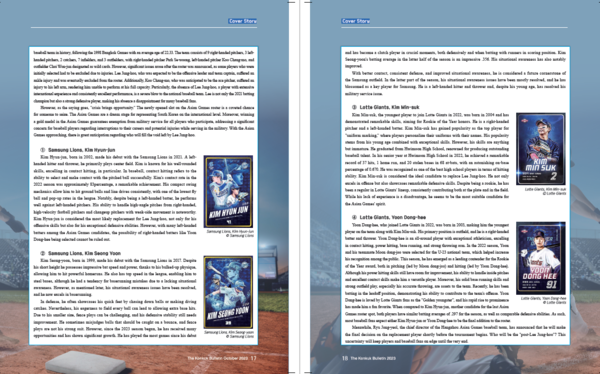
Who Will It Be?
2023 Hangzhou Asian Games
The Asian Games are a quadrennial multi-sport event for countries across Asia. South Korea plans to send a team of over 1,140 athletes to compete in 39 different sports. This Asian Games has generated even greater anticipation due to its previous postponement caused by COVID-19 and the inclusion of eSports and breaking as official events for the first time.
While the rosters for team sports like soccer and volleyball are somewhat settled, the final entry for the baseball national team remains uncertain. The Korea Baseball Organization (KBO) and the Korean Baseball Softball Association (KBSA) announced a preliminary roster of 24 players for the Hangzhou Asian Games back in June. The average age of this team is 23.21, making it the second-youngest Asian Games baseball team in history, following the 1998 Bangkok Games with an average age of 22.33. The team consists of 9 right-handed pitchers, 3 lefthanded pitchers, 2 catchers, 7 infielders, and 3 outfielders, with right-handed pitcher Park Se-woong, left-handed pitcher Koo Chang-mo, and outfielder Choi Won-jun designated as wild cards. However, significant issues arose after the roster was announced, as some players who were initially selected had to be excluded due to injuries. Lee Jung-hoo, who was expected to be the offensive leader and team captain, suffered an ankle injury and was eventually excluded from the roster. Additionally, Koo Chang-mo, who was anticipated to be the ace pitcher, suffered an injury to his left arm, rendering him unable to perform at his full capacity. Particularly, the absence of Lee Jung-hoo, a player with extensive international experience and consistently excellent performance, is a severe blow to the national baseball team. Lee is not only the 2021 batting champion but also a strong defensive player, making his absence a disappointment for many baseball fans.
However, as the saying goes, "crisis brings opportunity." The newly opened slot on the Asian Games roster is a coveted chance for someone to seize. The Asian Games are a dream stage for representing South Korea on the international level. Moreover, winning a gold medal in the Asian Games guarantees exemption from military service for all players who participate, addressing a significant concern for baseball players regarding interruptions to their careers and potential injuries while serving in the military. With the Asian Games approaching, there is great anticipation regarding who will fill the void left by Lee Jung-hoo.
① Samsung Lions, Kim Hyun-jun
Kim Hyun-jun, born in 2002, made his debut with the Samsung Lions in 2021. A lefthanded hitter and thrower, he primarily plays center field. Kim is known for his well-rounded skills, excelling in contact hitting, in particular. In baseball, contact hitting refers to the ability to select and make contact with the pitched ball successfully. Kim's contact rate in the 2022 season was approximately 83percentage, a remarkable achievement. His compact swing mechanics allow him to hit ground balls and line drives consistently, with one of the lowest fly ball and pop-up rates in the league. Notably, despite being a left-handed batter, he performs well against left-handed pitchers. His ability to handle high-angle pitches from right-handed, high-velocity fastball pitchers and changeup pitchers with weak-side movement is noteworthy. Kim Hyun-jun is considered the most likely replacement for Lee Jung-hoo, not only for his offensive skills but also for his exceptional defensive abilities. However, with many left-handed batters among the Asian Games candidates, the possibility of right-handed batters like Yoon Dong-hee being selected cannot be ruled out.
② Samsung Lions, Kim Seong Yoon
Kim Seong-yoon, born in 1999, made his debut with the Samsung Lions in 2017. Despite his short height he possesses impressive bat speed and power, thanks to his bulked-up physique, allowing him to hit powerful homeruns. He also has top speed in the league, enabling him to steal bases, although he had a tendency for baserunning mistakes due to a lacking situational awareness. However, as mentioned later, his situational awareness issues have been resolved, and he now excels in baserunning.
In defense, he often showcases his quick feet by chasing down balls or making diving catches. Nevertheless, his eagerness to field every ball can lead to allowing extra base hits. Due to his smaller size, fence plays can be challenging, and his defensive stability still needs improvement. He sometimes misjudges balls that should be caught on a bounce, and fence plays are not his strong suit. However, since the 2023 season began, he has received many opportunities and has shown significant growth. He has played the most games since his debut and has become a clutch player in crucial moments, both defensively and when batting with runners in scoring position. Kim Seong-yoon's batting average in the latter half of the season is an impressive .356. His situational awareness has also notably improved.
With better contact, consistent defense, and improved situational awareness, he is considered a future cornerstone of the Samsung outfield. In the latter part of the season, his situational awareness issues have been mostly resolved, and he has blossomed as a key player for Samsung. He is a left-handed hitter and thrower and, despite his young age, has resolved his military service issue.
③ Lotte Giants, Kim Min-suk
Kim Min-suk, the youngest player to join Lotte Giants in 2022, was born in 2004 and has demonstrated remarkable skills, aiming for Rookie of the Year honors. He is a right-handed pitcher and a left-handed batter. Kim Min-suk has gained popularity as the top player for "uniform marking," where players personalize their uniforms with their names. His popularity stems from his young age combined with exceptional skills. However, his skills are anything
but immature. He graduated from Hwimoon High School, renowned for producing outstanding baseball talent. In his senior year at Hwimoon High School in 2022, he achieved a remarkable record of 37 hits, 1 home run, and 20 stolen bases in 68 at-bats, with an astonishing on-base percentage of 0.670. He was recognized as one of the best high school players in terms of hitting
ability. Kim Min-suk is considered the ideal candidate to replace Lee Jung-hoo. He not only excels in offense but also showcases remarkable defensive skills. Despite being a rookie, he has been a regular in Lotte Giants' lineup, consistently contributing both at the plate and in the field. While his lack of experience is a disadvantage, he seems to be the most suitable candidate for the Asian Games' spirit.
④ Lotte Giants, Yoon Dong-hee
Yoon Dong-hee, who joined Lotte Giants in 2022, was born in 2003, making him the youngest player on the team along with Kim Min-suk. His primary position is outfield, and he is a right-handed batter and thrower. Yoon Dong-hee is an all-around player with exceptional athleticism, excelling in contact hitting, power hitting, base running, and strong throwing arm. In the 2022 season, Yoon and his teammate Moon dong-joo were selected for the U-23 national team, which helped increase his recognition among the public. This season, he has emerged as a leading contender for the Rookie of the Year award, both in pitching (led by Moon dong-joo) and hitting (led by Yoon Dong-hee). Although his power hitting skills still have room for improvement, his ability to handle inside pitches and excellent contact skills make him a versatile player. Moreover, his solid base running skills and strong outfield play, especially his accurate throwing, are assets to the team. Recently, he has been batting in the leadoff position, demonstrating his ability to contribute to the team's offense. Yoon Dong-hee is loved by Lotte Giants fans as the "Golden youngster”, and his rapid rise to prominence has made him a fan favorite. When compared to Kim Hyun-jun, another candidate for the last Asian Games roster spot, both players have similar batting averages of .297 for the season, as well as comparable defensive abilities. As such, most baseball fans expect either Kim Hyun-jun or Yoon Dong-hee to be the final addition to the roster.
Meanwhile, Ryu Jong-yeol, the chief director of the Hangzhou Asian Games baseball team, has announced that he will make the final decision on the replacement player shortly before the tournament begins. Who will be the "post-Lee Jung-hoo"? This uncertainty will keep players and baseball fans on edge until the very end.
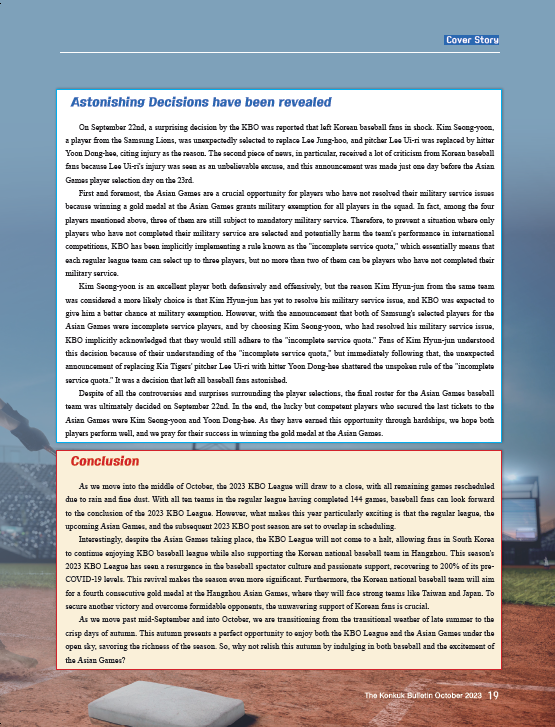
Astonishing Decisions have been revealed
On September 22nd, a surprising decision by the KBO was reported that left Korean baseball fans in shock. Kim Seong-yoon, a player from the Samsung Lions, was unexpectedly selected to replace Lee Jung-hoo, and pitcher Lee Ui-ri was replaced by hitter Yoon Dong-hee, citing injury as the reason. The second piece of news, in particular, received a lot of criticism from Korean baseball fans because Lee Ui-ri's injury was seen as an unbelievable excuse, and this announcement was made just one day before the Asian Games player selection day on the 23rd.
First and foremost, the Asian Games are a crucial opportunity for players who have not resolved their military service issues because winning a gold medal at the Asian Games grants military exemption for all players in the squad. In fact, among the four players mentioned above, three of them are still subject to mandatory military service. Therefore, to prevent a situation where only players who have not completed their military service are selected and potentially harm the team's performance in international competitions, KBO has been implicitly implementing a rule known as the "incomplete service quota," which essentially means that
each regular league team can select up to three players, but no more than two of them can be players who have not completed their military service.
Kim Seong-yoon is an excellent player both defensively and offensively, but the reason Kim Hyun-jun from the same team was considered a more likely choice is that Kim Hyun-jun has yet to resolve his military service issue, and KBO was expected to give him a better chance at military exemption. However, with the announcement that both of Samsung's selected players for the Asian Games were incomplete service players, and by choosing Kim Seong-yoon, who had resolved his military service issue, KBO implicitly acknowledged that they would still adhere to the "incomplete service quota." Fans of Kim Hyun-jun understood this decision because of their understanding of the "incomplete service quota," but immediately following that, the unexpected announcement of replacing Kia Tigers' pitcher Lee Ui-ri with hitter Yoon Dong-hee shattered the unspoken rule of the "incomplete
service quota." It was a decision that left all baseball fans astonished.
Despite of all the controversies and surprises surrounding the player selections, the final roster for the Asian Games baseball team was ultimately decided on September 22nd. In the end, the lucky but competent players who secured the last tickets to the Asian Games were Kim Seong-yoon and Yoon Dong-hee. As they have earned this opportunity through hardships, we hope both players perform well, and we pray for their success in winning the gold medal at the Asian Games.
Conclusion
As we move into the middle of October, the 2023 KBO League will draw to a close, with all remaining games rescheduled due to rain and fine dust. With all ten teams in the regular league having completed 144 games, baseball fans can look forward
to the conclusion of the 2023 KBO League. However, what makes this year particularly exciting is that the regular league, the upcoming Asian Games, and the subsequent 2023 KBO post season are set to overlap in scheduling.
Interestingly, despite the Asian Games taking place, the KBO League will not come to a halt, allowing fans in South Korea to continue enjoying KBO baseball league while also supporting the Korean national baseball team in Hangzhou. This season's
2023 KBO League has seen a resurgence in the baseball spectator culture and passionate support, recovering to 200% of its preCOVID-19 levels. This revival makes the season even more significant. Furthermore, the Korean national baseball team will aim for a fourth consecutive gold medal at the Hangzhou Asian Games, where they will face strong teams like Taiwan and Japan. To secure another victory and overcome formidable opponents, the unwavering support of Korean fans is crucial.
As we move past mid-September and into October, we are transitioning from the transitional weather of late summer to the crisp days of autumn. This autumn presents a perfect opportunity to enjoy both the KBO League and the Asian Games under the open sky, savoring the richness of the season. So, why not relish this autumn by indulging in both baseball and the excitement of the Asian Games?

